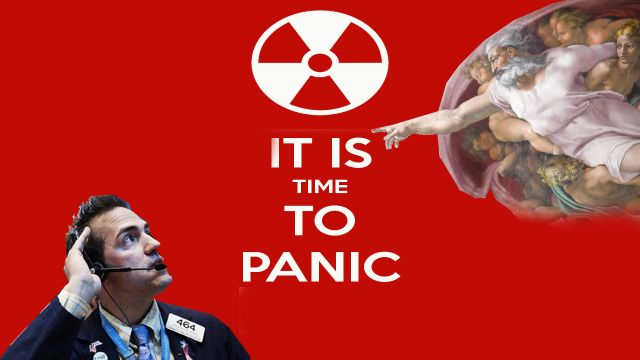| Online: | |
| Visits: | |
| Stories: |
NEWS: World Economy Crumpling NOW! Must see evidence of financial catastrophe in the making.
World stock indices plummet. This is the first time I have seen ALL major indices go negative since the last big crash…
The world economy stands on the brink of a second credit crisis as the vital transmission systems for lending between banks begin to seize up and the debt markets fall over. The latest round of quantitative easing from the European Central Bank will buy some time but it looks like too little too late.
The second global credit crisis is now already unfolding in China some 6,800 miles away from the epicentre of the first in the US. The bonds of Chinese real estate companies are now falling like dominoes. Kaisa, a Shenzhen-based, Hong Kong-listed developer that raised $2.5bn on international markets had to be bailed out by rival group Sunac last week after it defaulted onits debts. The bonds of other Chinese real estate groups such as Glorious Property and Fantasia have also sold off heavily as the contagion spreads.
Chinese authorities have responded to try and contain the situation. The People’s Bank of China introduced a surprise 50-point cut in the Reserve Requirement Ratio (RRR) from 20pc to 19.5pc. But this misses the point, the credit system in China is completely unsustainable unless new money is printed every year to refinance the old, simply tinkering to ease liquidity won’t cut it.
The strain in its banking system is highlighted by the elevated levels of the Shanghai Interbank Offered Rate (SHIBOR), which shows Chinese banks are worried about lending to each other.
There is no schadenfreude in watching China unravel. The idea that this is an isolated incident is laughable, remember the very same was said of US subprime. The problem is that banks such as Standard Chartered and HSBC have both rapidly increased their lending operations in Asia since 2008.







Depressions occur after investment bubbles burst. In free-market capitalism, capital generates income for the owners of the capital which in turn is used to create additional capital. This is very good. Sometimes, it can be actually too good. As capital continues to accumulate, its owners find it more and more difficult to deploy it efficiently. The business sector generally must interact with the household sector by selling goods and services or lending to them. When capital accumulates too rapidly, the productive capacity of the business sector can outpace the ability of the household sector to absorb the increasing production.
The capitalists, or if you prefer, job creators use their increasing wealth and income to reinvest, thus increasing the productive capacity of the business they own. They also lend their accumulated wealth to other business as well as other entities after they have exhausted opportunities within business they own. As they seek to deploy ever more capital, excess factories, housing and shopping centers are built and more and more dubious loans are made. This is overinvestment. As one banker described the events leading up to 2008 – First the banks lent all they could to those who could pay them back and then they started to lend to those could not pay them back. As cash poured into banks in ever increasing amounts, caution was thrown to the wind. For a while consumers can use credit to buy more goods and services than their incomes can sustain. Ultimately, the overinvestment results in a financial crisis that causes unemployment, reductions in factory utilization and bankruptcies all of which reduce the value of investments.
If the economy was suffering from accumulated chronic underinvestment, shifting income from the non-rich to the rich would make sense. Underinvestment would mean there was a shortage of shopping centers, hotels, housing and factories were operating at 100% of capacity but still not able to produce as many cars and other goods as people needed. It might not seem fair, but the quickest way to build up capital is to take income away from the middle class who have a high propensity to consume and give to the rich who have a propensity to save (and invest). Except for periods in the 1950s and 1960s and possibly the 1990’s when tax rates on the rich just happened to be high enough to prevent overinvestment, the economy has generally suffered from periodic overinvestment cycles.
It is not just a coincidence that tax cuts for the rich have preceded both the 1929 and 2007 depressions. The Revenue acts of 1926 and 1928 worked exactly as the Republican Congresses that pushed them through promised. The dramatic reductions in taxes on the upper income brackets and estates of the wealthy did indeed result in increases in savings and investment. However, overinvestment (by 1929 there were over 600 automobile manufacturing companies in the USA) caused the depression that made the rich, and most everyone else, ultimately much poorer.
Since 1969 there has been a tremendous shift in the tax burdens away from the rich on onto the middle class. Corporate income tax receipts, whose incidence falls entirely on the owners of corporations, were 4% of GDP then and are now less than 1%. During that same period, payroll tax rates as percent of GDP have increased dramatically. The overinvestment problem caused by the reduction in taxes on the wealthy is exacerbated by the increased tax burden on the middle class. While overinvestment creates more factories, housing and shopping centers; higher payroll taxes reduces the purchasing power of middle-class consumers. …”
http://seekingalpha.com/article/1543642